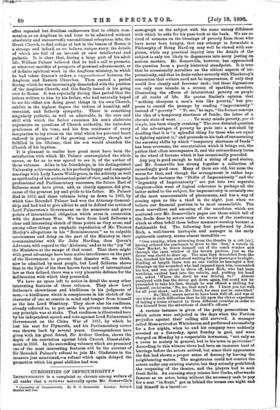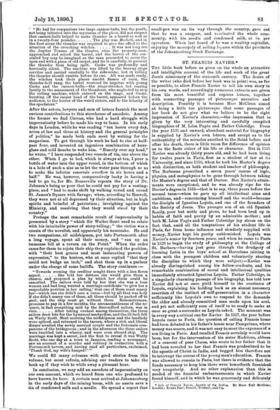CURIOSITIES OF IMPECUNIOSITY" IMPECUNIOSITY is a complaint so chronic among
writers of all ranks that a reviewer naturally opens Mr. Somerville's
• Curiosities of Impecuniosity. By H. G. Soinerrilla. London : Richard Bentley and Eon.
monograph on the subject with the same uneasy diffidence with which he asks for his pass-book at the bank. We are so tired of sermons on the blessings of poverty from those who.
have never been hungry, that any attempt to formulate a Philosophy of Being Hard-up may well be viewed with sus- picion, while any practical inquiry into the details of the subject is only too likely to degenerate into sorry jesting on. serious matters. Mr. Somerville, however, has approached. the question from a purely historical standpoint. It is true. that he occasionally moralises on the ethical aspects of im- pecuniosity, and that he deals rather severely with Thackeray's. contention that writers need not be impecunious, if only they would live cleanly and forswear sack ; but these digressions. are only rare islands in a stream of sparkling anecdote, illustrating the effects of intermittent poverty on people of all ranks of life. He quotes Smiles's opinion that " nothing sharpens a man's wits like poverty," ba pro- poses to emend the passage by reading " impecuniosity " instead of "poverty." "To me," he says, "the former conveys the idea of a temporary shortness of funds ; the latter of a
chronic state of want To many minds poverty, pur et simple, has been simply crushing." The ever-debated question. of the advantages of poverty he puts into a nut-shell by
deciding that it is "a splendid thing for those who are equal to fighting against it," and proceeds to his task of enumerating
the amusing shifts by which "temporary shortness of funds"' has been overcome, the eccentricities which it brings out, the-
pathos that often accompanies it, and the extraordinary turns in the wheel of fortune which it has occasionally preceded. Any peg is good enough to hold a string of good stories, and Mr. Somerville has strung together a collection, of exceedingly good ones. Many of them are old, but none the worse for that, and though the arrangement is rather hap- hazard—for instance the "Shifts of Impecuniosity" and the "Ingenuity of Impecuniosity" are put into two separate- chapters—this want of logical coherence is perhaps all the better suited to the subject, for impecuniosity is certainly one of the most unaccountable of phenomena, and has a way of coming upon us like a thief in the night, just when we believe our financial position to be most unassailable. The most marvellous and amusing of the anecdotes which are scattered over Mr. Somerville's pages are those which tell of the deeds done by actors under the stress of the insolvency which so often befell them before mummer-worship became fashionable fad. The following feat performed by John Rich, a well-known harlequin and manager in the early eighteenth century, seems almost incredible :—
"One evening, when returning from the theatre in a cab [sic], having ordered the coachman to drive to the 'Sun,' a tavern in. Clare Market, he threw himself out of the coach window and through the open window of the tavern parlour, just as the driver was about to draw up. The man then descended from the box, touched his hat, and stood waiting for his passenger to alight. Finding at length there was no one visible he besought a few blessings on the scoundrel who had imposed upon him, remounted, his box, and was about to drive off, when Rich, who had been watching, vaulted back into the vehicle, and, putting his head out, asked Where the devil he was driving to ? ' Almost paralysed with fear the driver got down again, but could not be persuaded to take his fare, though he was offered a shilling for himself, exclaiming, 'No, no, that won't do. I know you too welL for all your shoes ; and so, Mr. Devil, for once you're outwitted.' He [Rich] seems never to have been well off, and was at one time in such difficulties that he hit upon the clever expedient of taking a house situated in three different counties in order tcr free himself from the attentions of sheriff's officers."
A curious instance is given of the petty persecutions to. which actors were subjected in the days when the Puritan
prejudice against their calling still survived. A manager called Moss arrived at Whitehaven and performed successfully for a few nights, when he and his company were suddenly arrested on a Saturday, spent Sunday in gaol, and were- charged on Monday by a respectable townsman, "not only as. a curse to society in general, but to his town in particular." According to this witness there had been an immense haul of
herrings before the actors arrived, but since their appearance the fish had shown a proper sense of decency by leaving the. neighbouring waters. The magistrates could not convict the. actors under any existing statute, but they actually prohibited. the reopening of the theatre, and the players had to seek fresh fields. An amusing story relates how Cooke, afterwards famous as an actor, being without the necessary cash to pay for a seat "in front," got in behind, the scenes- one night and hid himself in a barrel "He had for companions two large cannon-balls, but the youth, not being initiated into the mysteries of the place, did not suspect that cannon-balls helped to make thunder in a barrel as well as in a twenty-four pounder The play was Macbeth, and in the first scene the thunder was required to give due effect to the situation of the crouching witches It was not long ere the Jupiter 'Amami of the theatre, alias the property-man, approached and seized the barrel, and the horror of the con- cealed boy may be imagined as the man proceeded to cover the open end with a piece of old carpet, and tie it carefully, to prevent the thunder from being spilt. Cooke was profoundly and heroically silent. The machine was lifted by the brawny stage servitor and carried carefully to the side-scene, lest in rolling the thunder should rumble before its cue. All was made ready, the witches took their places amidst flames of resin, the thunder-bell rang, the barrel received its impetus with young Cooke and the cannon-balls,—the stage-stricken lad roaring lustily to the amazement of the thunderer, who neglected to stop the rolling machine, which entered on the stage, and Cooke, bursting off the carpet head of the barrel, appeared before the audience, to the horror of the weird sisters, and to the hilarity of the spectators."
After the actors, lawyers and men of letters furnish the most curious contributions to this storehouse of anecdote. Among the former we find Curran, who had a hard straggle with impecuniosity before he made his way to fame. In his early days in London, while he was reading "ten hours every day, seven at law and three at history and the general principles of politics," he made both ends meet by writing for the magazines. To get through his work he had to rise at half- past four, and invented an ingenious combination of hour- glass and cold douche to wake him. "Exactly over my head," he wrote, "I have suspended two vessels of tin, one above the other. When I go to bed, which is always at ten, I pour a bottle of water into the upper vessel, in the bottom of which is a hole of such a size as to let the water pass through so as to make the inferior reservoir overflow in six hours and a half." He was, however, comparatively lucky in having a bed to go to, for Mr. Somerville repeats the story of Dr. Johnson's being so poor that he could not pay for a resting. place, and "had to make shift by walking round and round St. James's Square with Savage; when, according to Boswell, they were not at all depressed by their situation, but in high spirits and brimful of patriotism ; inveighing against the Ministry, and resolving that they would stand by their country."
Perhaps the most remarkable result of impecuniosity is presented by a story "which Sir Walter Scott used to relate with his inimitable power of story-telling;" the victim was a cousin of the novelist, and apparently his namesake. He and two companions, all midshipmen, put into Portsmouth after a long voyage, spent all their money, and "ran up an immense bill at a tavern on the Point." When the order came for them to rejoin their ship they explained the position, with "their best graces and most insinuating powers of expression," to the hostess, who at once replied "that they could not budge an inch," and shut them up in a parlour under the charge of some bailiffs. The story continues :—
"Towards evening the creditor sought them with a leas fierce aspect She told her debtors she would give them a chance, and proposed a plan by which her claim could be cancelled. The sailors were told by her that she was a lone woman and had long wanted a marriage-certificate to give her a respectable position in her calling,' that one of them must marry her—which one she didn't care a curse—but by all that was holy if she didn't marry one of them, all three should be packed off to gaol, and the ship must go without them. Remonstrances, promises to pay in a few months, the unreasonableness of the re- quest, in fact everything said by the discomfited sailors, was in vain After taking counsel among themselves, the three sailors drew lots for the hymeneal martyrdom, and the ill-luck fell on Watty Scott. Next morning the midshipman and the landlady were spliced, and returned to the tavern, where a rich and liberal dinner awaited the newly married couple and the fortunate com- panions of the bridegroom ; and in the afternoon the three sailors were tumbled into a wherry, and were soon aboard ship. The marriage was kept a secret, and the first to reveal it was Watty Scott, who one day at a town in Jamaica, reading a newspaper, saw an account of a murder and robbery in connection with a Portsmouth tavern, and having read all particulars, exclaimed, 'Thank God, my wife's hanged !' "
We could fill many columns with good stories from this volume, but must refrain, advising our readers to take the book up if they wish to while away a pleasant hour.
In conclusion, we may add an anecdote of impecuniosity on our own account, which we heard from one who professed to have known its hero. A certain man arrived at Johannesburg in the early days of the mining boom, with no assets save a tin of condensed milk and a needle. He spread a report that
small-pox was on its way through the country, gave out that he was a surgeon, and vsccinated the whole com- munity, with his needle and condensed milk, at 5s. per operation. When last heard of he was a wealthy capitalist, enjoying the monopoly of selling liquors within the precincts of the Johannesburg Stock Exchange.



































 Previous page
Previous page